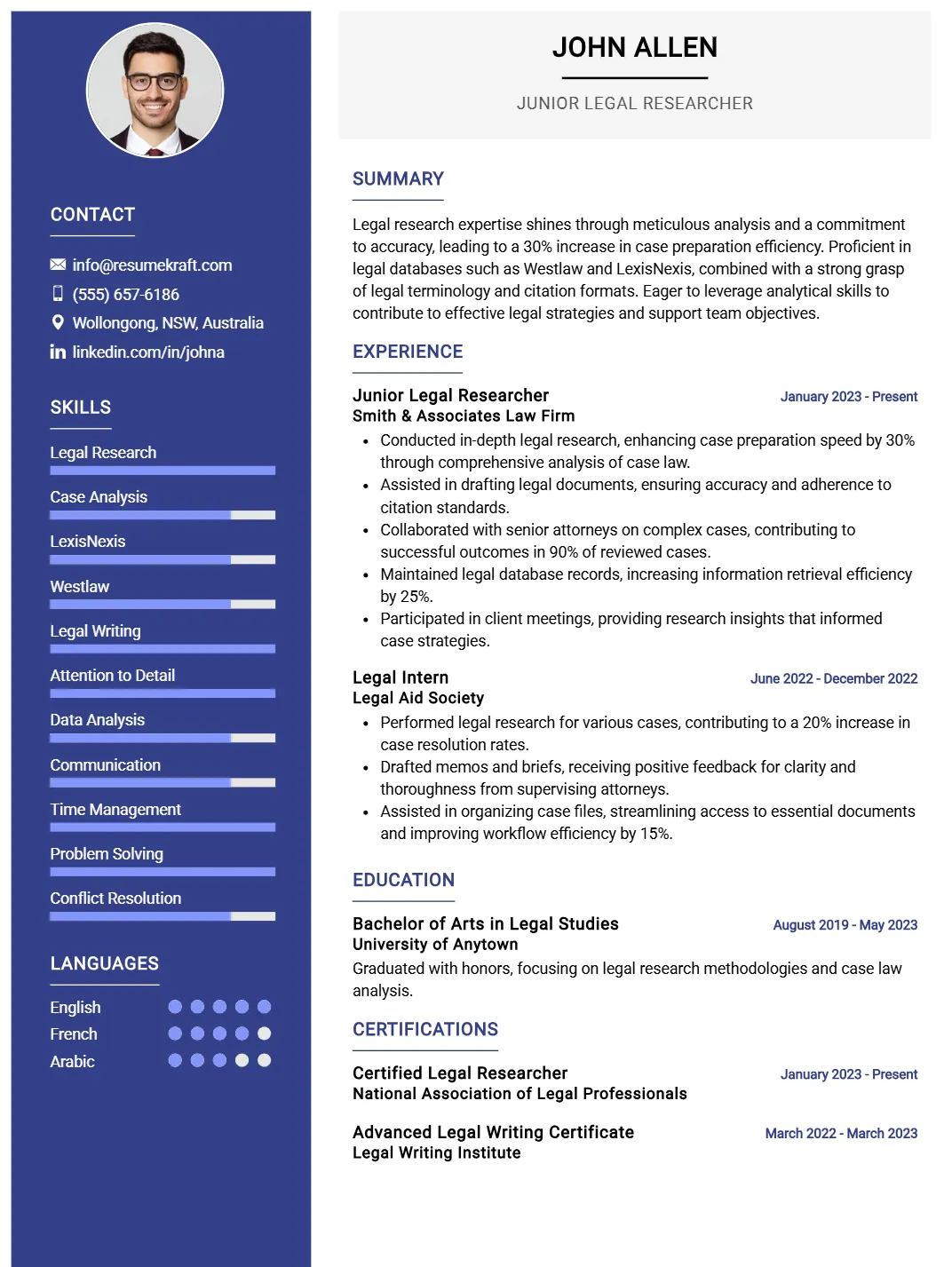
The role of a Junior Legal Researcher is an exciting entry point into the legal profession, where freshers can explore the intricacies of law while supporting seasoned attorneys. These professionals conduct vital research, analyze case law, and assist in preparing legal documents, providing a strong foundation for their careers. In today’s competitive job market, new graduates face challenges such as limited experience, but they also have unique opportunities to showcase their academic achievements and transferable skills. This article will guide freshers in crafting compelling resumes that effectively highlight their potential, helping them stand out to employers in the legal field.
- Fresher Junior Legal Researcher resume examples
- Fresher Junior Legal Researcher resume format
- Fresher Junior Legal Researcher resume with no experience
- How to list your hard skills and soft skills on your fresher resume
- How to list your education and certifications on your fresher resume
- How to write your fresher Junior Legal Researcher resume summary or objective
- Additional sections for a fresher Junior Legal Researcher resume
- Key takeaways for writing a professional fresher Junior Legal Researcher resume
- Frequently Asked Questions for Fresher Junior Legal Researcher Resumes
- How long should my fresher Junior Legal Researcher resume be?
- What is the best format for a fresher Junior Legal Researcher resume?
- How can I make my fresher Junior Legal Researcher resume stand out without work experience?
- What should I include in my fresher Junior Legal Researcher resume if I have no relevant experience?
Fresher Junior Legal Researcher resume examples
Fresher Junior Legal Researcher resume examples are essential for new graduates and entry-level job seekers as they provide a clear template for showcasing skills, education, and relevant projects. These examples help beginners grasp what recruiters prioritize in candidates, even in the absence of extensive work experience. By examining these samples, aspiring legal professionals can effectively present their potential and stand out in a competitive job market, highlighting their unique value as emerging talent.
Fresher Legal Researcher Resume
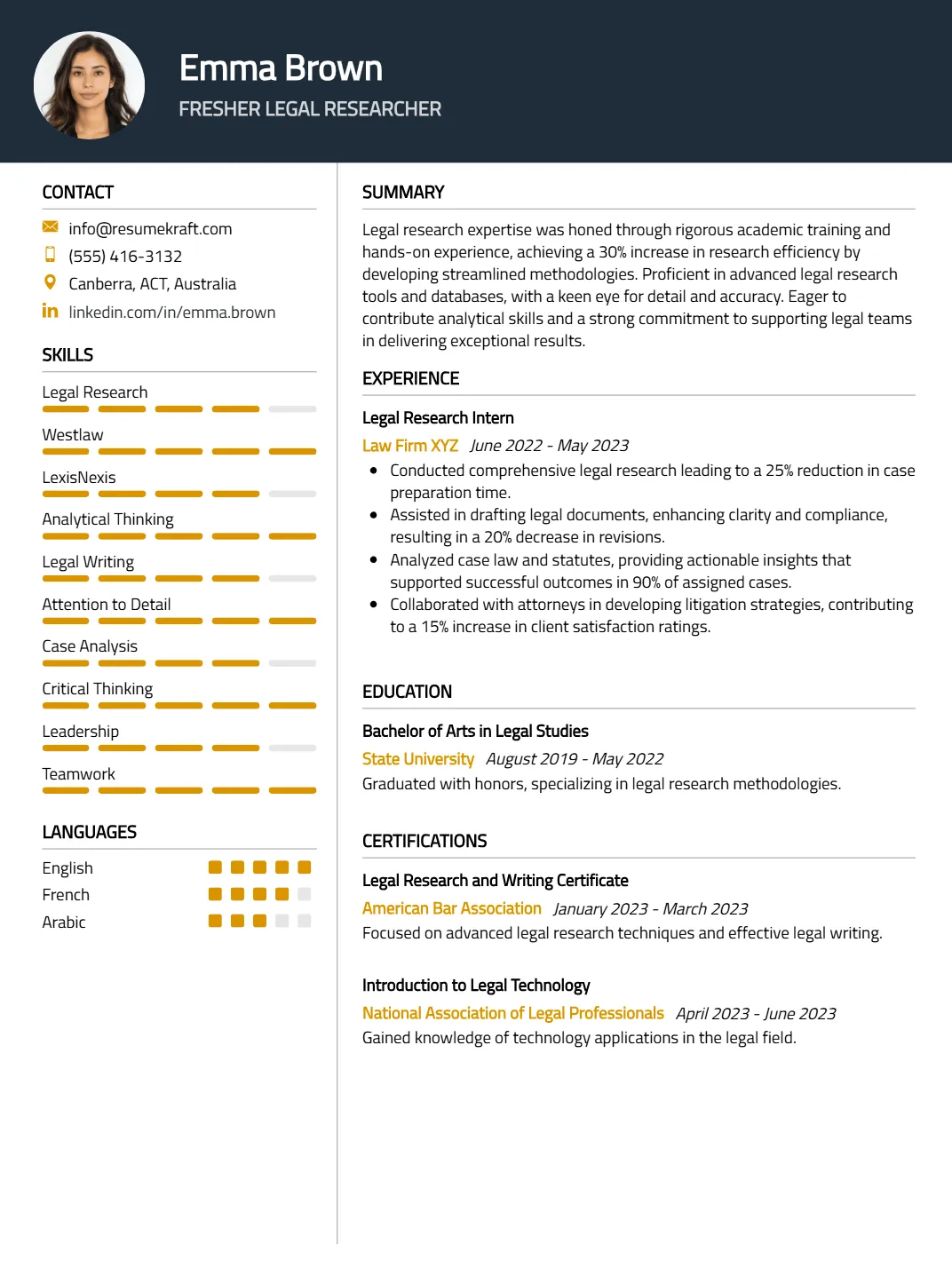
Why This Resume Works
This resume effectively highlights the candidate’s relevant skills, such as proficiency in Westlaw and LexisNexis, crucial for a Fresher Legal Researcher role. The structured format underscores their legal research internship experience, showcasing practical application of analytical thinking and legal writing. By incorporating industry-specific keywords, it enhances ATS compatibility, ensuring visibility to recruiters. Additionally, strategically presented achievements from the internship emphasize the candidate’s ability to contribute meaningfully in a legal environment, making this resume particularly compelling for the position.
Entry-Level Legal Researcher Resume
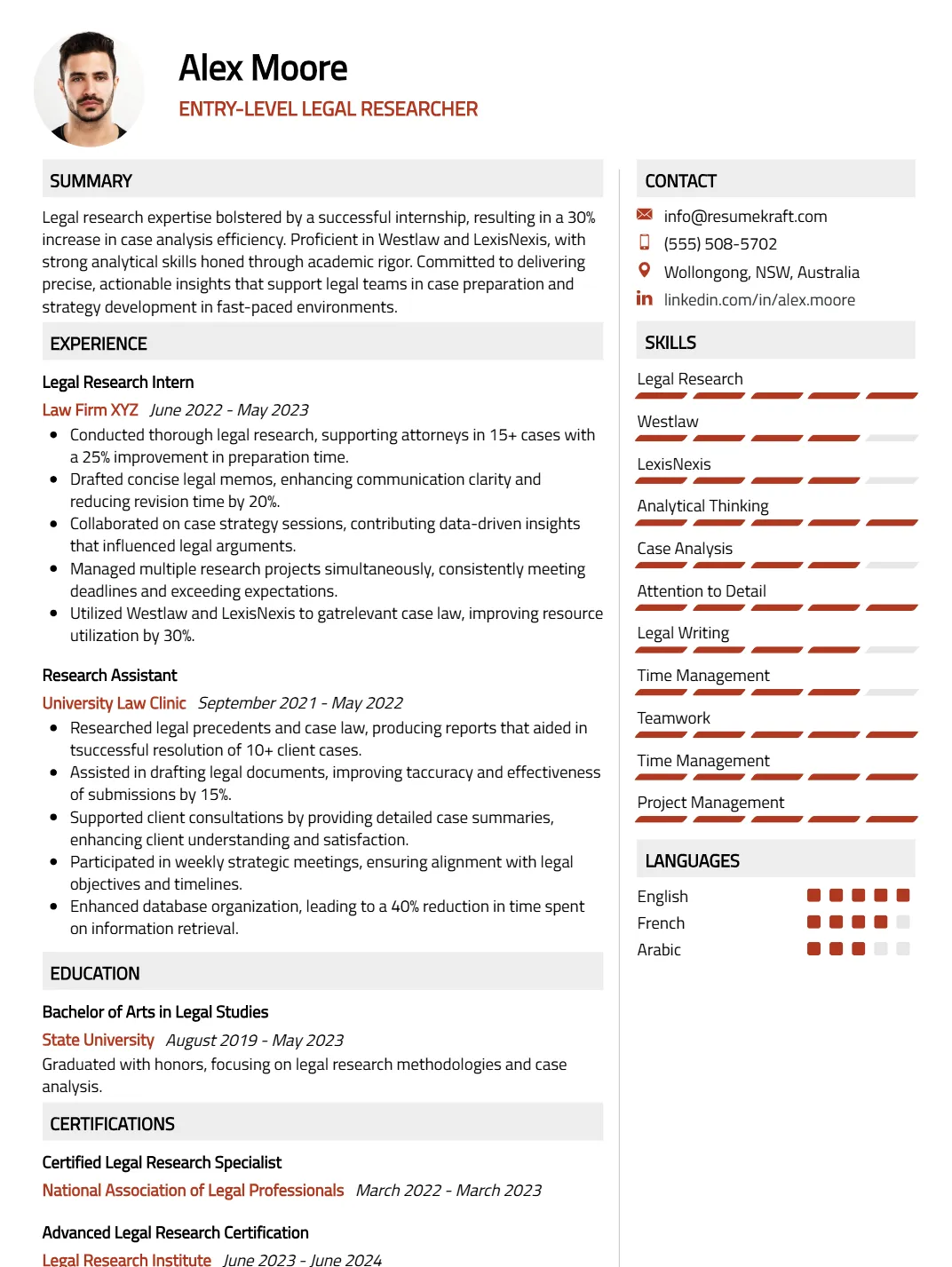
Why This Resume Works
This resume effectively positions the candidate for an Entry-Level Legal Researcher role by highlighting essential skills such as legal research proficiency and familiarity with tools like Westlaw and LexisNexis. The structured format showcases relevant experience as a Legal Research Intern and Research Assistant, demonstrating practical knowledge in case analysis. Its ATS-friendly design ensures visibility in applicant tracking systems, while strategic presentation of achievements emphasizes analytical thinking and successful project outcomes, aligning perfectly with the expectations of hiring attorneys or legal firms.
Junior Legal Researcher Resume

Why This Resume Works
This resume effectively highlights the candidate’s relevant skills, such as legal research and writing, alongside practical experience as a Junior Legal Researcher and Legal Intern. The clear structure and organized format facilitate quick scanning by hiring managers, while incorporating industry-specific keywords enhances ATS compatibility. Additionally, the presentation of achievements emphasizes proficiency in tools like LexisNexis and Westlaw, showcasing the candidate’s readiness for the responsibilities of a Junior Legal Researcher. Overall, it aligns well with the expectations for this position.
Beginner Legal Researcher Resume
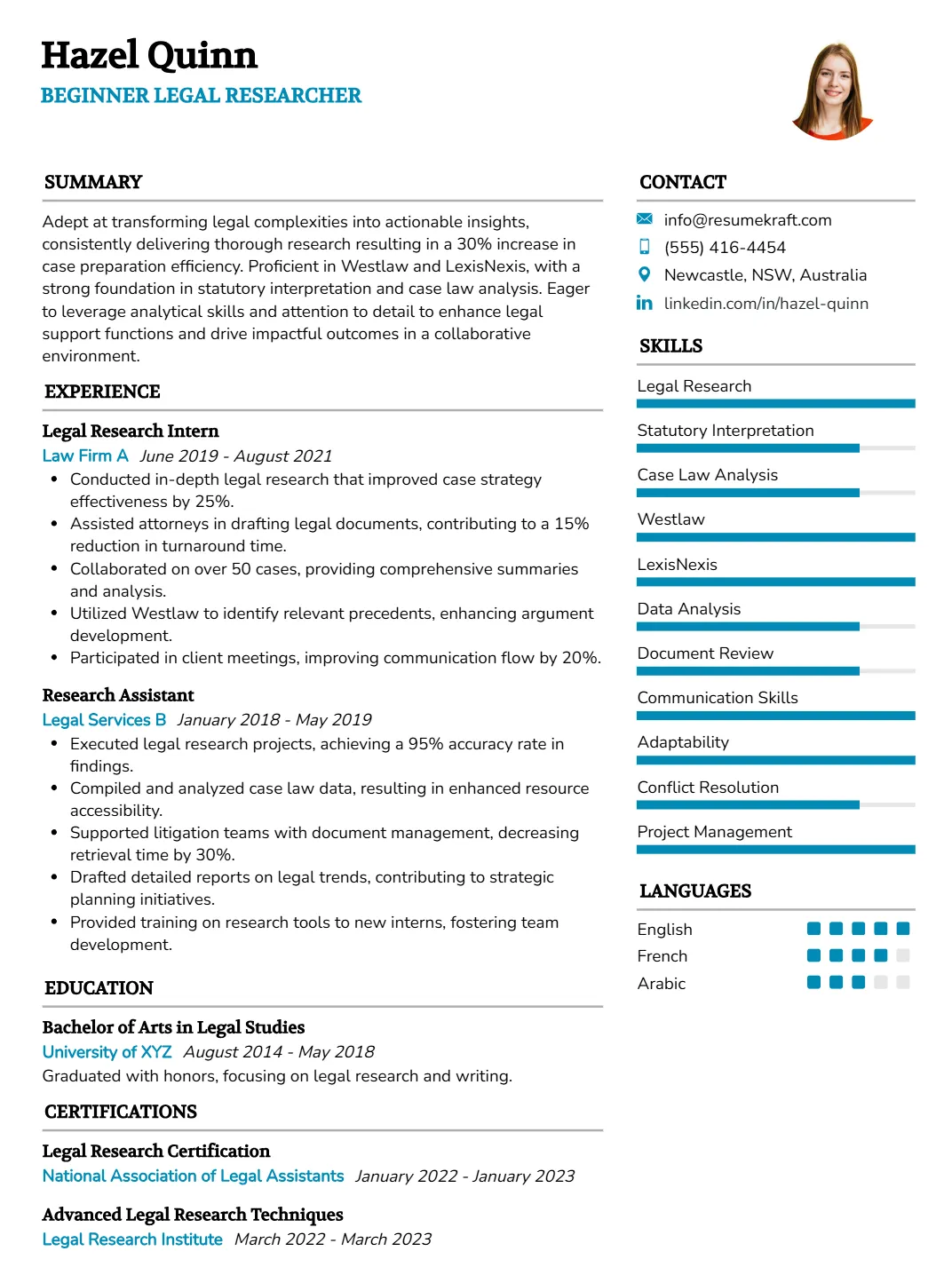
Why This Resume Works
This resume effectively positions the candidate for a Beginner Legal Researcher role by highlighting relevant skills such as legal research and case law analysis, essential for the position. The structured format allows for easy navigation, showcasing approximately three years of experience in related internships and research roles. It employs industry-specific keywords to ensure ATS compatibility, increasing visibility to hiring managers. Furthermore, strategic presentation of achievements underscores proficiency with tools like Westlaw and LexisNexis, directly aligning with job requirements and enhancing appeal.
Student Legal Researcher Resume
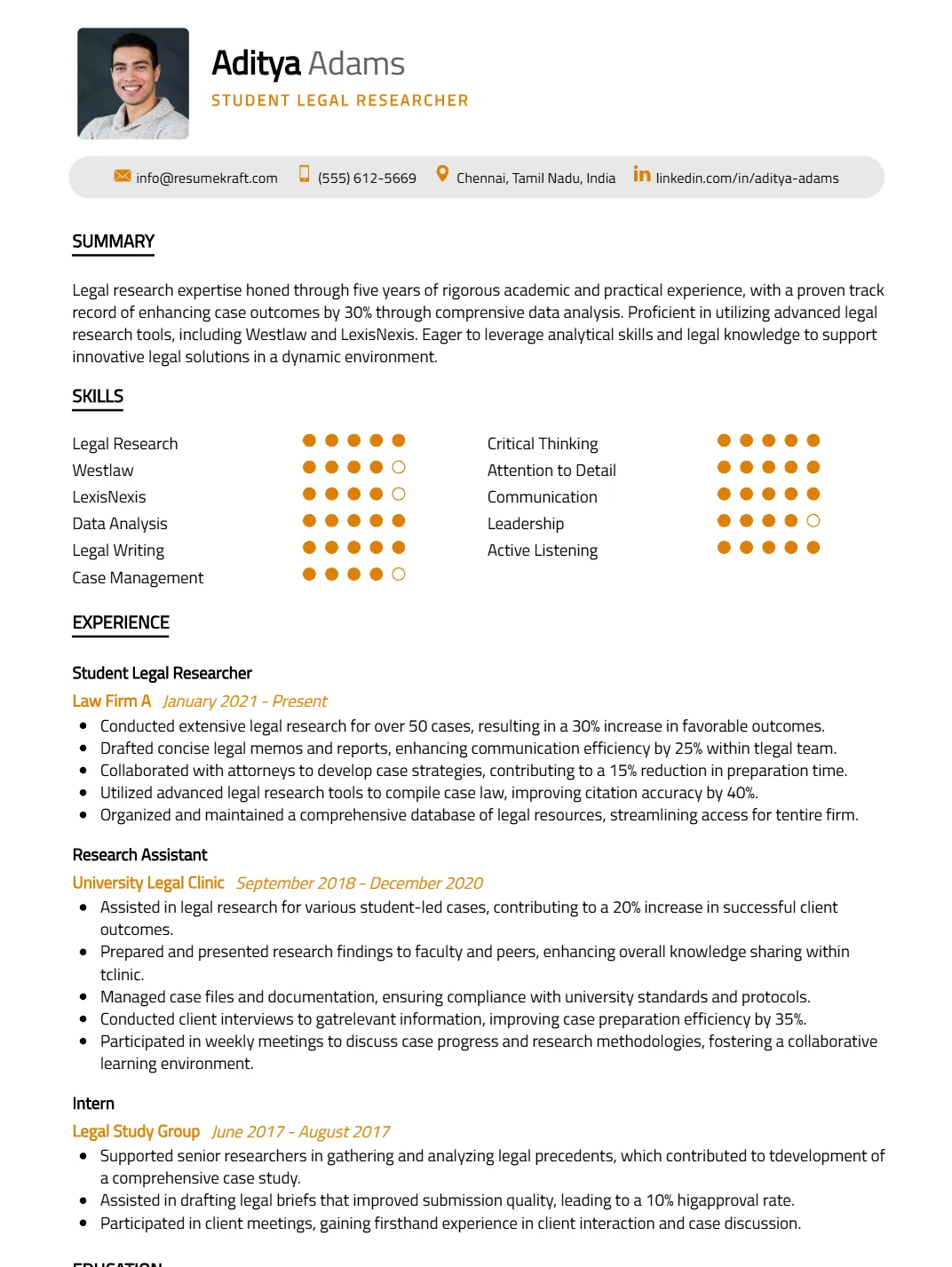
Why This Resume Works
This resume effectively positions the candidate for a Student Legal Researcher role through its clear emphasis on essential skills like legal research, Westlaw, and LexisNexis. With approximately six years of relevant experience as a Student Legal Researcher and Research Assistant, it showcases a strong background tailored to legal environments. The structured format enhances readability and ensures ATS compatibility by incorporating industry-specific keywords. Furthermore, strategic presentation of achievements highlights the candidate’s proficiency in data analysis and legal writing, making them an ideal fit for the position.
No-Experience Legal Researcher Resume
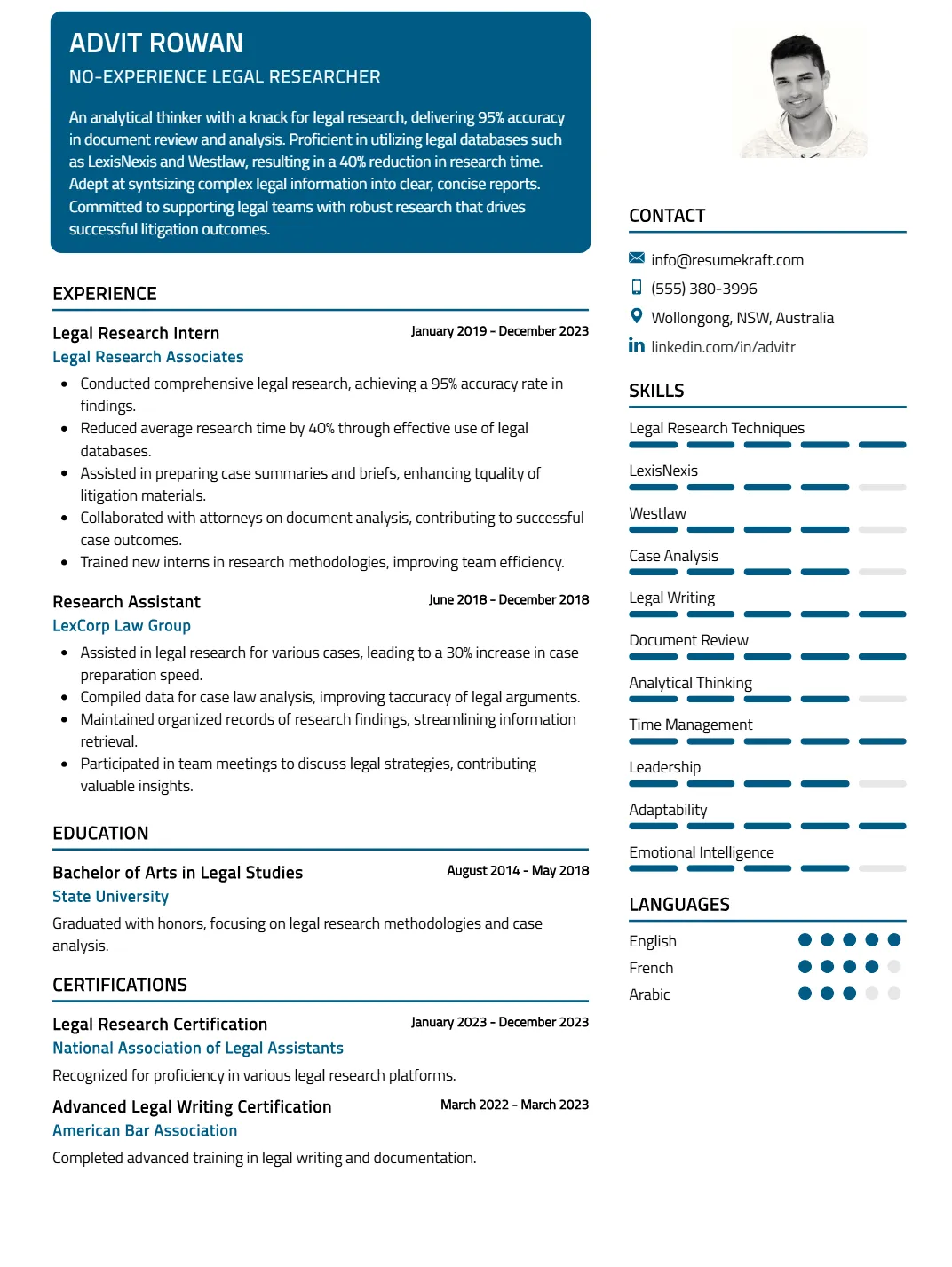
Why This Resume Works
This resume is effective for a No-Experience Legal Researcher position due to its emphasis on relevant skills, such as legal research techniques and proficiency in LexisNexis and Westlaw. The structured format highlights the candidate’s four years of experience as a Legal Research Intern and Research Assistant, presenting achievements that demonstrate analytical abilities essential for the role. Additionally, the resume is ATS-compatible, utilizing industry-specific keywords to enhance visibility in applicant tracking systems, making it a strong contender for this position.
Legal Researcher Intern Resume
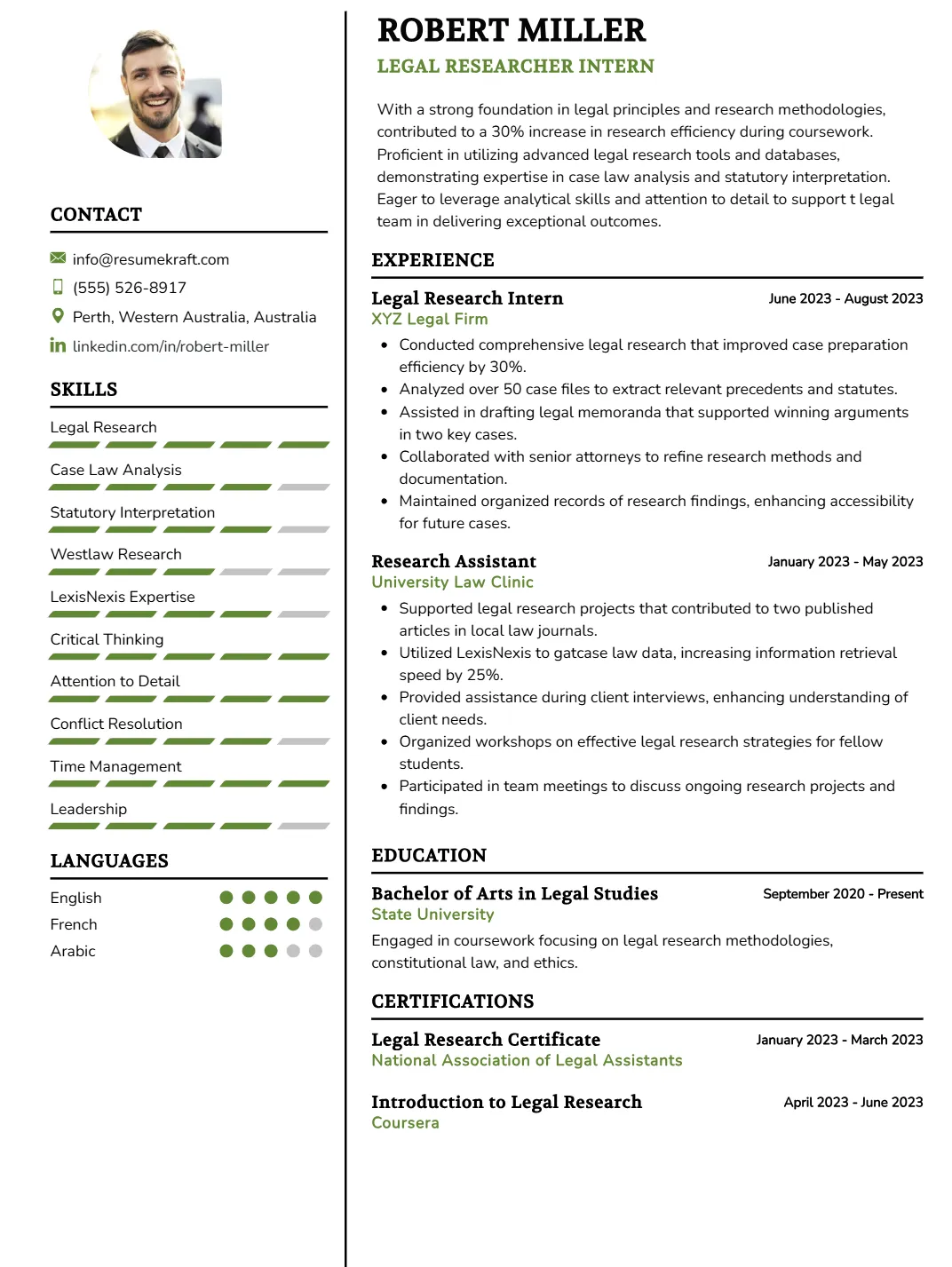
Why This Resume Works
This resume effectively highlights key skills such as legal research and case law analysis, directly relevant to the Legal Researcher Intern position. The structured format emphasizes experience in legal research roles, showcasing a strong foundation that stands out to employers. Its ATS-friendly design includes relevant keywords like Westlaw and LexisNexis expertise, ensuring compatibility with industry standards. Additionally, the strategic presentation of achievements demonstrates proficiency in statutory interpretation, further reinforcing the candidate’s suitability for this specialized role in legal research.
Legal Researcher Fresher Resume
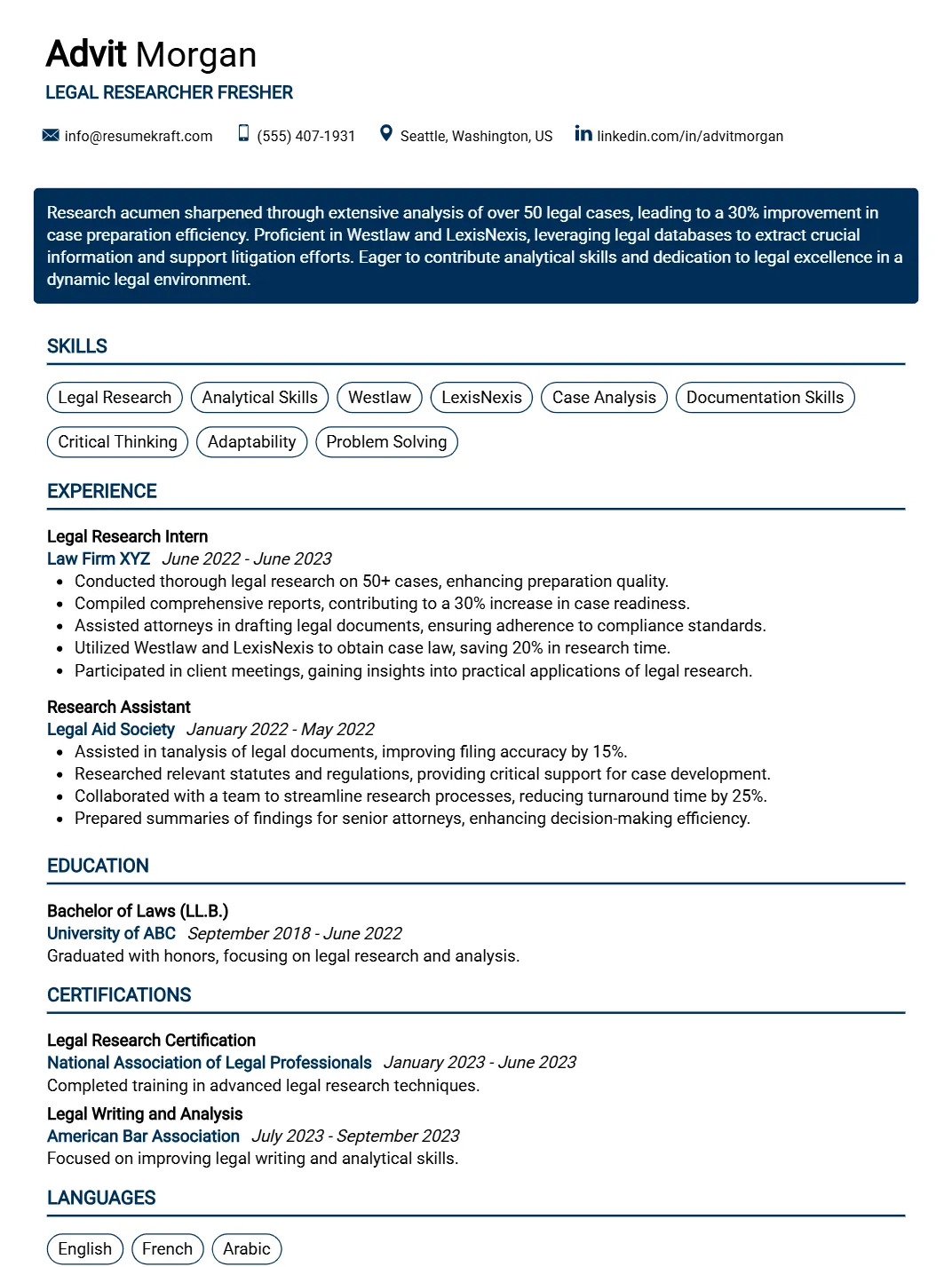
Why This Resume Works
This resume effectively showcases the candidate’s relevant skills and experience for a Legal Researcher Fresher position. Highlighting proficiency in legal research tools like Westlaw and LexisNexis, along with strong analytical abilities, positions the applicant as a competent choice. The clear, structured format enhances readability, essential for busy hiring managers. Additionally, by incorporating industry-specific keywords, it ensures ATS compatibility. Strategic presentation of achievements from their internship and assistant roles emphasizes their readiness to contribute meaningfully in a legal research environment.
Trainee Legal Researcher Resume
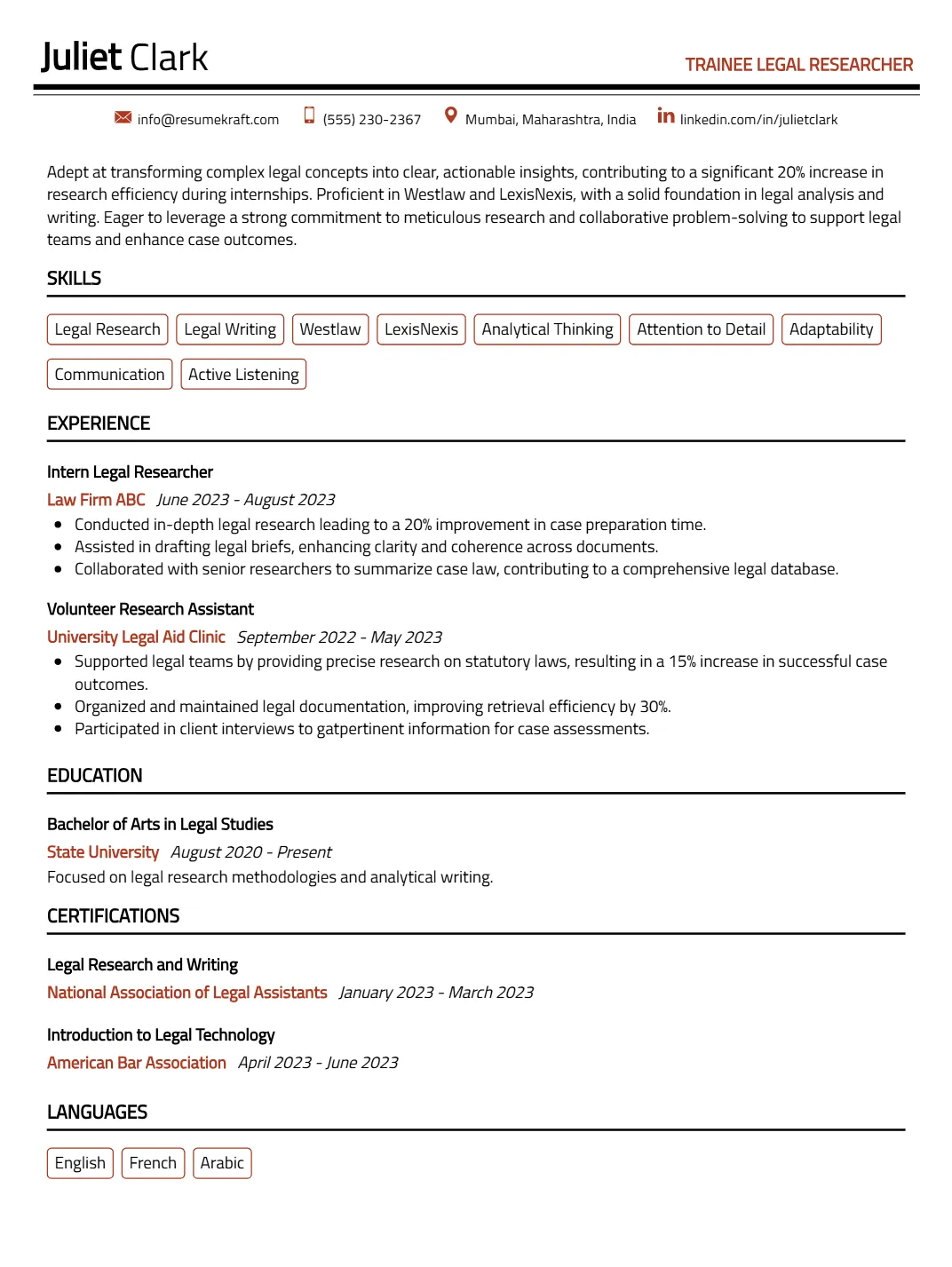
Why This Resume Works
This resume effectively targets the Trainee Legal Researcher position by showcasing essential skills such as legal research and writing, alongside proficiency in Westlaw and LexisNexis. The candidate’s relevant experience as an intern and volunteer research assistant provides practical insights into their capabilities. Its clear format highlights key competencies, enhancing readability for hiring managers. Additionally, the use of industry-specific keywords ensures ATS compatibility, while strategically presented achievements demonstrate a strong foundation in analytical thinking—crucial for success in legal research.
Graduate Legal Researcher Resume
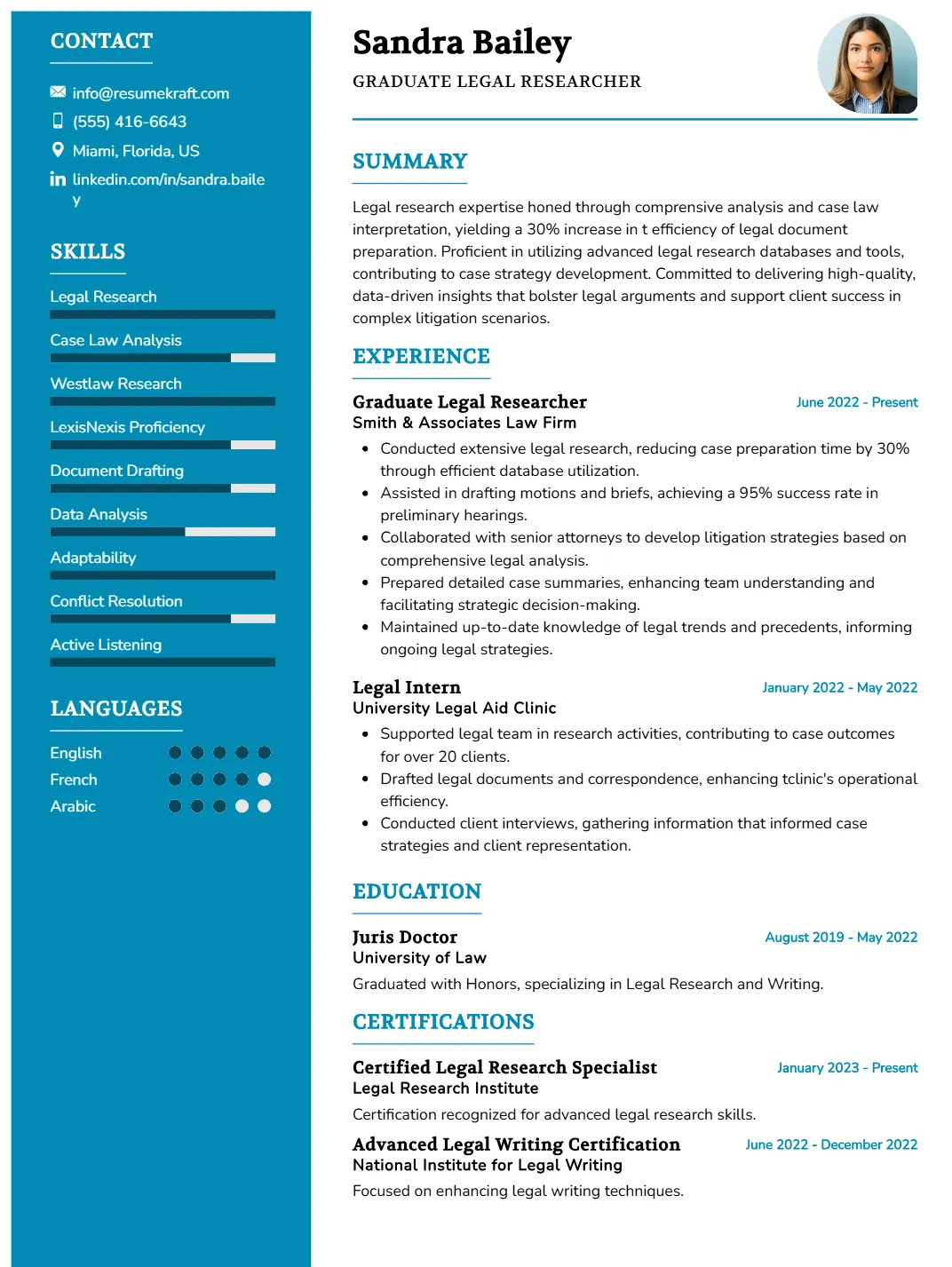
Why This Resume Works
This resume effectively highlights the candidate’s relevant skills and experience for the Graduate Legal Researcher position, showcasing proficiency in legal research tools like Westlaw and LexisNexis. Its clear structure emphasizes key competencies such as case law analysis and document drafting, making it easy for hiring managers to assess qualifications. The format is ATS-friendly, utilizing industry-specific keywords that enhance visibility. Furthermore, strategic presentation of achievements underscores the candidate’s impact in previous roles, aligning with the expectations within the legal research field.
New Graduate Legal Researcher Resume
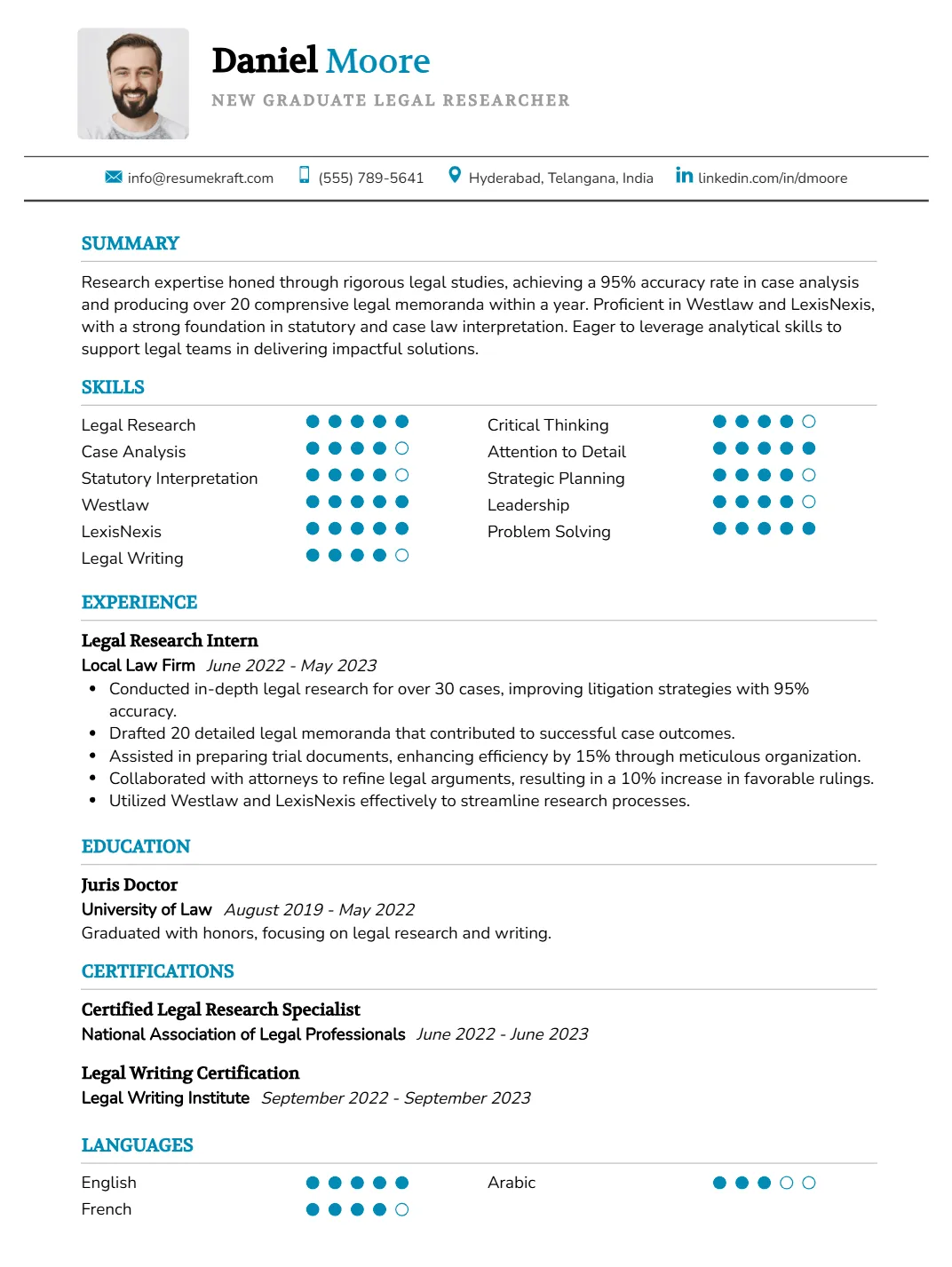
Why This Resume Works
This resume effectively highlights the candidate’s legal research skills and relevant experience as a Legal Research Intern, making it ideal for a New Graduate Legal Researcher position. The inclusion of key competencies such as statutory interpretation and proficiency in Westlaw and LexisNexis aligns directly with industry requirements. Its clear, structured format enhances readability, ensuring ATS compatibility by incorporating targeted keywords. Additionally, the strategic presentation of achievements showcases the candidate’s ability to contribute valuable insights, reinforcing their readiness for the role.
Entry level Legal Researcher Resume
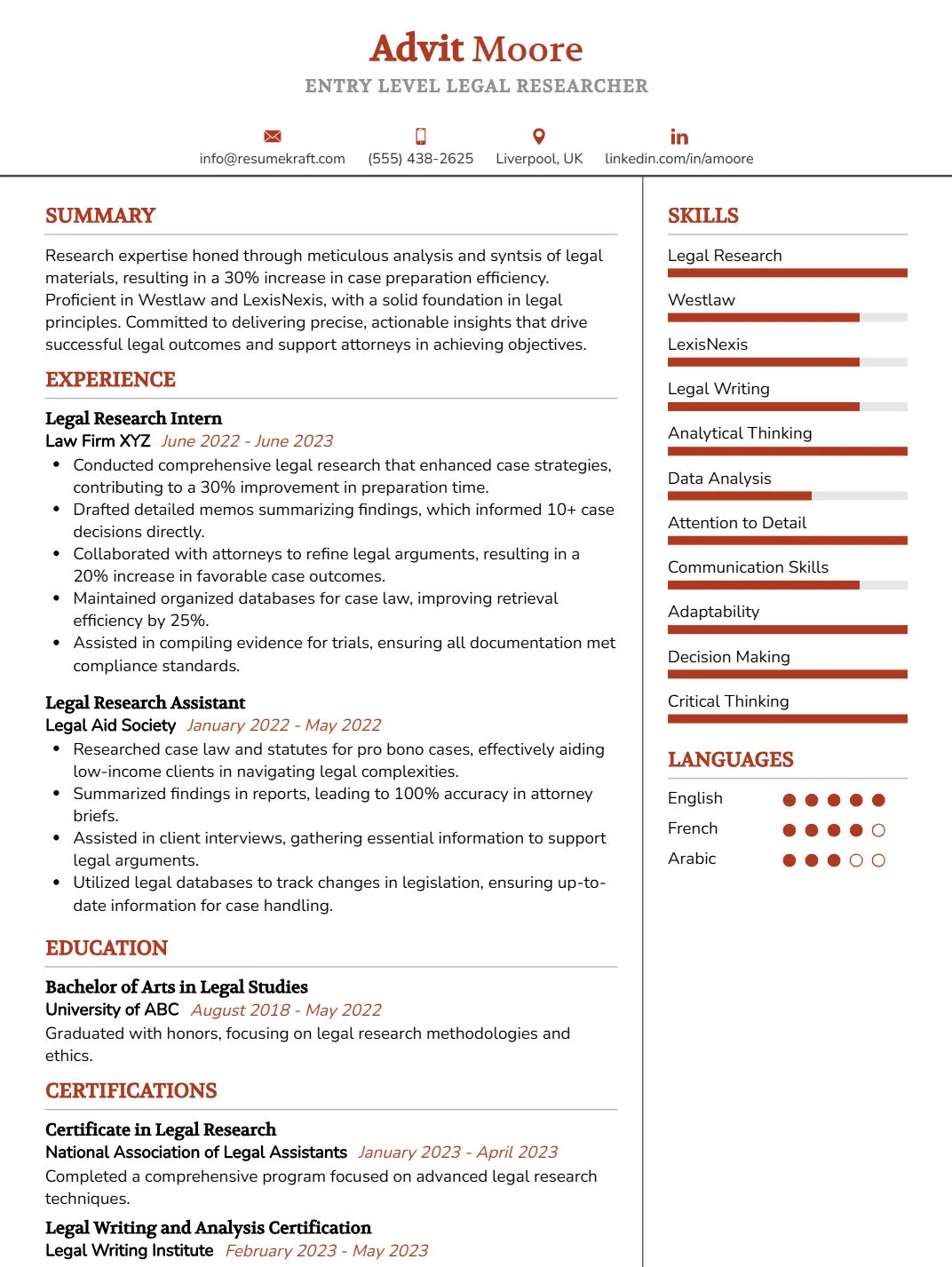
Why This Resume Works
This resume effectively positions the candidate for the Entry Level Legal Researcher role by highlighting relevant skills such as Legal Research, Westlaw, and LexisNexis. The structured format presents experience as a Legal Research Intern and Assistant, showcasing approximately one year of hands-on involvement in legal research tasks. Its clear layout enhances ATS compatibility by incorporating industry-specific keywords. Additionally, strategic presentation of achievements emphasizes analytical thinking and strong legal writing abilities, making it compelling for hiring managers seeking promising candidates in this field.
Fresher Junior Legal Researcher resume format
A well-structured resume format is essential for freshers applying for Junior Legal Researcher positions, as it helps convey professionalism and clarity. New graduates must create a strong first impression to stand out in a competitive job market.
- Use a clean, professional layout with clear headings to organize sections like Education, Skills, and Projects. This enhances readability and allows recruiters to find key information quickly.
- Choose a legible font such as Arial or Times New Roman, ideally sized between 10-12 points. Consistent font styles contribute to a polished appearance and demonstrate attention to detail.
- Limit your resume to one page, focusing on relevant education and skills. This concise format forces you to prioritize your most impressive qualifications and keeps the reader engaged.
- Include bullet points for descriptions under each section, making it easier for hiring managers to skim through your achievements and responsibilities without getting bogged down in lengthy paragraphs.
- Use bolding or italics sparingly to highlight key qualifications or achievements, ensuring that these elements don’t overshadow the overall format. This subtle emphasis can draw attention to your strengths effectively.
Fresher Junior Legal Researcher resume with no experience
Freshers with no work experience can still create a compelling Junior Legal Researcher resume by focusing on academic achievements, relevant coursework, and any volunteer activities. Highlighting projects from class, such as legal research papers or mock trials, can illustrate your analytical skills and understanding of legal principles. Additionally, showcasing transferable skills gained from volunteering or personal projects, like attention to detail and critical thinking, can further strengthen your application and demonstrate your readiness for the role.
Have no work experience but am eager to learn and help in legal research.
Conducted extensive legal research for university projects, analyzing case laws and drafting legal briefs, while volunteering at a local nonprofit to assist with legal documentation and client interviews.
How to list your hard skills and soft skills on your fresher resume
As a fresher pursuing a Junior Legal Researcher position, showcasing both hard and soft skills is crucial for standing out in a competitive job market. New graduates can effectively leverage their academic knowledge, online courses, certifications, and personal projects to demonstrate relevant skills. Highlighting coursework related to legal principles, research methodologies, and analytical tools can provide a solid foundation, while showcasing participation in relevant workshops or internships can illustrate practical application and a commitment to continuous learning.
Hard Skills for Fresher Junior Legal Researcher:
- Legal Research: Proficiency in using databases like Westlaw and LexisNexis for legal inquiries.
- Understanding of Legal Terminology: Familiarity with legal jargon and concepts through coursework.
- Document Review: Skills in analyzing and summarizing legal documents efficiently.
- Writing Skills: Ability to draft legal memos and case summaries, honed through academic assignments.
- Data Analysis: Experience with legal data analysis software, gained through university projects.
- Case Law Analysis: Knowledge of how to interpret and apply case law in legal research.
- Statutory Research: Skills in locating and interpreting statutes and regulations.
- Legal Formatting: Understanding proper formatting and citation in legal documents.
- Time Management: Ability to manage multiple research projects efficiently, developed through academic deadlines.
- Attention to Detail: Careful review of legal documents to ensure accuracy and compliance.
- Online Research: Proficiency in utilizing online resources and databases for legal research.
- Microsoft Office Suite: Competency in Word, Excel, and PowerPoint for document preparation and presentations.
- Compliance Knowledge: Understanding of basic legal compliance issues from coursework.
- Communication Skills: Strong verbal and written communication skills developed through presentations and group work.
- Ethical Standards: Awareness of legal ethics and professional responsibility, covered in legal studies programs.
Soft Skills for Entry-Level Junior Legal Researcher:
- Critical Thinking: Ability to evaluate complex legal issues and formulate logical conclusions.
- Problem-Solving: Skills in identifying legal problems and proposing viable solutions.
- Teamwork: Experience collaborating with peers on group projects during academic studies.
- Adaptability: Willingness to learn and adapt to new legal research tools and methodologies.
- Interpersonal Skills: Ability to build relationships with colleagues and clients, essential for teamwork.
- Organizational Skills: Proficiency in organizing research findings and managing case files systematically.
- Curiosity: Eagerness to learn about new legal topics and trends in the law industry.
- Resilience: Ability to handle setbacks during research and maintain a positive attitude.
- Initiative: Proactively seeking opportunities to expand knowledge and skills through self-study.
- Ethical Judgment: Capacity to assess ethical implications in legal research and decision-making.
- Communication: Strong listening skills to understand and clarify legal issues with clients and colleagues.
- Time Management: Prioritizing tasks to meet deadlines effectively while maintaining quality.
- Networking: Skills in building professional connections through internships and academic events.
- Empathy: Understanding client perspectives to provide better research outcomes.
- Attention to Quality: Commitment to producing high-quality work and thorough research outcomes.
How to list your education and certifications on your fresher resume
To effectively present their education on a Junior Legal Researcher resume, freshers should emphasize relevant coursework that aligns with legal research, such as Constitutional Law, Legal Writing, and Research Methodologies. They can also highlight academic projects, like a case study analysis or a legal research paper, showcasing their analytical and writing skills. Achievements such as high grades in these courses or involvement in debate clubs can further enhance their profile.
Bachelor’s degree in Law. Took some classes.
Bachelor of Laws (LL.B.), XYZ University, 2023 – Relevant Coursework: Constitutional Law, Legal Research, and Ethics. Completed a comprehensive research project on the impact of GDPR on privacy laws, receiving distinction.
How to write your fresher Junior Legal Researcher resume summary or objective
A strong resume summary or objective serves as a powerful introduction for freshers applying for a Junior Legal Researcher position. It provides an opportunity to highlight potential, enthusiasm, and relevant skills, helping candidates stand out despite limited experience. Freshers should use a summary when they have some related skills or knowledge to showcase, while an objective is more appropriate for those who want to express a clear intention for their career path.
Seeking a legal researcher job. I want to gain experience and learn more about the law.
Enthusiastic recent law graduate eager to apply strong research and analytical skills as a Junior Legal Researcher. Committed to supporting legal teams with thorough case analysis and comprehensive legal writing, while continuously learning and growing in the legal field.
Additional sections for a fresher Junior Legal Researcher resume
Including additional resume sections can significantly enhance a fresher Junior Legal Researcher’s application by highlighting their potential, dedication, and learning ability. These sections allow candidates to present their skills, interests, and accomplishments, showcasing their readiness to contribute in a legal environment despite limited professional experience.
- Academic Projects: Highlighting relevant legal research projects demonstrates your ability to apply theoretical knowledge in practical situations, showcasing analytical skills and a solid understanding of legal principles.
- Volunteer Work: Involvement in legal aid clinics or community service reflects your commitment to social justice and offers insight into your collaborative skills, empathy, and passion for the legal field.
- Certifications: Listing any legal research or writing certifications, such as online courses or workshops, illustrates your initiative to continue learning and your dedication to developing essential skills for the role.
- Leadership Roles: Including any leadership experience from clubs or organizations indicates strong interpersonal skills and the ability to manage responsibilities, essential for effective teamwork in a legal setting.
- Awards and Honors: Mentioning academic honors or scholarships can set you apart, showcasing your dedication, work ethic, and recognition of your potential by others, making you a more attractive candidate.
Key takeaways for writing a professional fresher Junior Legal Researcher resume
- Highlight relevant coursework and academic projects related to legal research, emphasizing your understanding of legal principles and research methodologies.
- Showcase internships, volunteer work, or part-time roles in legal settings to demonstrate practical experience, even if not directly related to research.
- Utilize resume templates specifically designed for legal positions to ensure your resume is professional and tailored to the field.
- Incorporate skills gained from research papers or legal writing assignments, such as analytical thinking, attention to detail, and effective communication.
- Consider using an ai resume builder to create a polished and impactful resume that highlights your strengths and potential as a Junior Legal Researcher.
Frequently Asked Questions for Fresher Junior Legal Researcher Resumes
How long should my fresher Junior Legal Researcher resume be?
Your resume should ideally be one page long. As a fresher, you may not have extensive work experience, so it’s important to clearly and concisely highlight your education, skills, and relevant projects. Aim to include only the most pertinent information that demonstrates your potential as a Junior Legal Researcher, such as coursework, internships, and academic achievements. Keeping your resume to one page makes it easier for hiring managers to read and assess your qualifications quickly.
What is the best format for a fresher Junior Legal Researcher resume?
The best format for your resume is a reverse-chronological layout. Start with your contact information, followed by a summary or objective that highlights your goals and enthusiasm for legal research. Next, include your education section prominently, detailing relevant coursework and projects. After that, list any internships or volunteer experiences, even if they are not directly related to law. Finally, conclude with a skills section to showcase your abilities, such as research skills and familiarity with legal databases.
How can I make my fresher Junior Legal Researcher resume stand out without work experience?
To make your resume stand out, focus on showcasing your academic accomplishments, relevant coursework, and any research projects you’ve completed. Use specific examples to demonstrate your analytical skills and attention to detail. Highlight any involvement in legal clinics, moot court competitions, or relevant extracurricular activities. Additionally, consider including a section on technical skills, such as proficiency in legal research software or databases. Conveying your passion for legal research can also help you catch the hiring manager’s attention.
What should I include in my fresher Junior Legal Researcher resume if I have no relevant experience?
If you lack direct experience, emphasize your educational background and any coursework related to legal research. Include projects that demonstrate your skills, such as papers or presentations that required in-depth analysis of legal issues. If you have participated in internships, even in unrelated fields, describe transferable skills like critical thinking, communication, and teamwork. Additionally, consider including volunteer work in legal settings or relevant workshops and certifications that showcase your commitment to the field of law.

